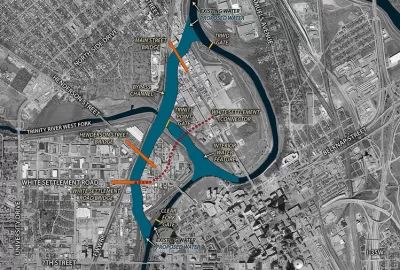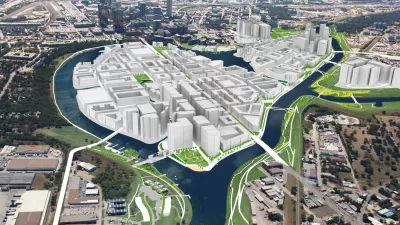Originally planned as a primarily residential development, the riverfront development could shift to a focus on entertainment, commerce, and outdoor recreation.

A massive riverfront district in Fort Worth, Texas could be up for a reimagining after a new report that calls on the city to reconsider the plan for the area. Jenny Rudolph, Harrison Mantas, and Abby Church outline the report’s findings in the Fort Worth Star-Telegram.
As the article explains, “The $1.1 billion public investment to mitigate Trinity River flooding by building new channels will open up more than 5 miles of shoreline and 200 acres for development just north of downtown. As originally conceived, Panther Island’s development would be focused on dense residential buildings with some commercial.”
Now, the report from a consultant firm calls for more mixed-use development in Panther Island and “stresses the need for a unified development strategy for the more than 500 acres of public and privately owned land, as well as the need to avoid displacing surrounding communities such as the historic North Side.”
“Planners are moving away from the residential-focused original plans and instead envision a district with a vibrant entertainment hub, outdoor recreation and the potential to attract companies and talent to the city, HR&A’s report said.” The report adds that the district should be pedestrian-friendly, accessible, and have a “recognizable and distinct identity while also complementing the adjacent downtown and connecting seamlessly with surrounding neighborhoods.”
According to the article, “Although conceived years ago, the project got an official greenlight in January 2022 when the U.S. Army Corps of Engineers received $403 million from the federal government to create the bypass channel connecting two sections of the Trinity River.”
FULL STORY: The vision for Fort Worth’s Panther Island is changing. Here’s what a new report says.

Alabama: Trump Terminates Settlements for Black Communities Harmed By Raw Sewage
Trump deemed the landmark civil rights agreement “illegal DEI and environmental justice policy.”

Planetizen Federal Action Tracker
A weekly monitor of how Trump’s orders and actions are impacting planners and planning in America.

The 120 Year Old Tiny Home Villages That Sheltered San Francisco’s Earthquake Refugees
More than a century ago, San Francisco mobilized to house thousands of residents displaced by the 1906 earthquake. Could their strategy offer a model for the present?

In Both Crashes and Crime, Public Transportation is Far Safer than Driving
Contrary to popular assumptions, public transportation has far lower crash and crime rates than automobile travel. For safer communities, improve and encourage transit travel.

Report: Zoning Reforms Should Complement Nashville’s Ambitious Transit Plan
Without reform, restrictive zoning codes will limit the impact of the city’s planned transit expansion and could exclude some of the residents who depend on transit the most.

Judge Orders Release of Frozen IRA, IIJA Funding
The decision is a victory for environmental groups who charged that freezing funds for critical infrastructure and disaster response programs caused “real and irreparable harm” to communities.
Urban Design for Planners 1: Software Tools
This six-course series explores essential urban design concepts using open source software and equips planners with the tools they need to participate fully in the urban design process.
Planning for Universal Design
Learn the tools for implementing Universal Design in planning regulations.
Clanton & Associates, Inc.
Jessamine County Fiscal Court
Institute for Housing and Urban Development Studies (IHS)
City of Grandview
Harvard GSD Executive Education
Toledo-Lucas County Plan Commissions
Salt Lake City
NYU Wagner Graduate School of Public Service



























